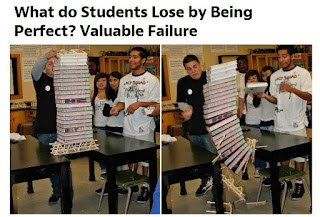As you are no doubt aware, there has been much discussion these last few years on the lessons that children and adults can learn from failure. Studies have shown that when people approach new situations from a fear of failing, they tend to be more conservative in their problem-solving, and creative thinking can shut down. While we don’t necessarily want to encourage people to fail, we do want to exhort students and adults to try new things and take risks, for it’s from these experiences that we truly learn. As a friend of mine used to say, “It’s not experience that is the best teacher; it’s bad experience,” since it’s from our unsuccessful attempts that we learn how to improve and make things better for the next time.
I thought of this as I recently read an article sent by a Bosque alumni parent. In Mind/Shift magazine’s, “What Do Students Lose By Being Perfect? Valuable Failure,” Holly Korbey discusses the temptation on the part of students to “play it safe” and not go out on a limb for fear of failing. We can talk to them until we’re blue in the face about Babe Ruth’s saying, “Never let the fear of striking out get in your way,” but students may still internalize a message that failure is to be avoided at all costs.
In this piece, Korbey offer tips for educators and parents alike. She says that as parents, we must avoid the completely understandable but ultimately counter-productive desire to help our children when they encounter an obstacle that may affect them negatively. For example, if they leave a homework assignment at home, we should not bring it to them at school, no matter how much they may plead with us to do so. She encourages parents to see their job as long-term and realize there will be bumps in the road in the short term that we will need to tolerate. (We may all need to work on our deep breathing during these times.)
Korbey also asks parents to focus on the learning process rather than only paying attention to the final product and to bear in mind that many more children may be affected by a fear of failure than we may realize. As a practical tip, Korbey advises parents to step away from the parent portal that so many schools have, so they are not checking on their child’s grades on a minute-by-minute basis or making sure that they are up to the nano-second on their child’s every assignment. I knew parents at other schools who literally checked their child’s grades 20 times before noon just to see if anything new showed up. If we want our children to develop a long-term view, we must model that for them. As she says in closing her article, “And this is the real shame: fear of failure taints the waters of learning, keeping kids from taking risks. Making failure normal — even celebrated — (author of The Fear of Failure) Lahey contends, may be uncomfortable in the short-term, but in the long haul makes for happier, more confident kids.”
